Key takeaways:
- VPNs enhance privacy and security by creating a secure tunnel for internet connections, significantly impacting online experiences.
- Different VPN protocols (e.g., OpenVPN, L2TP/IPsec, PPTP) offer varying levels of security and speed, affecting user choices and experiences.
- Successful VPN setup requires careful planning, selecting a reputable provider, and performing post-setup tests to ensure optimal performance.
- Using a VPN provides benefits such as enhanced online privacy, access to geo-restricted content, and improved security on public Wi-Fi networks.

Understanding VPN Technology
When I first delved into the world of VPN technology, I was struck by its dual-role of enhancing privacy and securing internet connections. It’s fascinating how a virtual private network creates a secure tunnel between your device and the internet, making it nearly impossible for prying eyes to access your data. This concept of virtual security resonated with me, especially during a time when data breaches felt rampant and privacy was a growing concern.
Setting up a VPN not only felt like empowering my digital presence but also introduced me to the technical side of telecommunications. I remember the moment I connected to a server halfway across the globe, and the feeling of exploring the internet without the fear of surveillance—it was liberating! Have you ever wondered what it’s like to browse with that kind of freedom? For me, it was a game changer, highlighting how technology can drastically alter our online experiences.
Understanding the underlying technology of VPNs can seem daunting at first, but the benefits are worth the initial learning curve. With protocols like OpenVPN and IKEv2, each has its own strengths and weaknesses, shaping how securely your data travels. I spent hours researching these protocols, and trust me, becoming familiar with them added a layer of comfort in knowing I was making informed choices about my online safety.
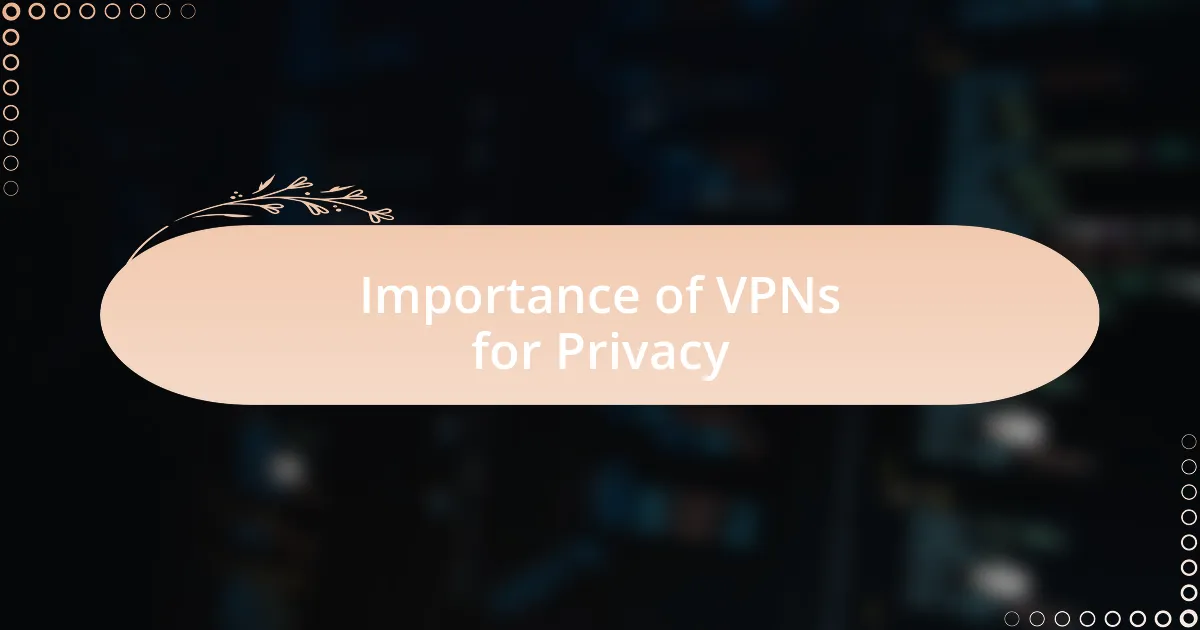
Importance of VPNs for Privacy
When I started using a VPN, I quickly discovered that its importance for privacy can’t be overstated. With each connection to the VPN server, I could feel a layer of protection enveloping my online activities, shielding my personal information from hackers and snoopers. Can you imagine browsing freely, knowing your data is encrypted and hidden from prying eyes? This sense of security fundamentally transformed how I approached my online presence.
One experience that stands out is when I was traveling abroad and needed to access sensitive emails. Knowing that my connection was encrypted made all the difference. I felt like I had a fortress around my virtual self, allowing me to communicate without the fear of being intercepted. It really hit me then how vital a VPN is—not just for accessing content but for protecting one’s digital footprint in an age where privacy is increasingly at risk.
I often find myself reflecting on the implications of not using a VPN, especially considering the various ways companies track users online. Each website I visit leaves a trail of data, and without a VPN, that data is easily accessible. Isn’t it unsettling to think about how much of our personal information is up for grabs? Making the switch to VPN technology was a proactive decision that has reassured me about my online safety and privacy, and I wholeheartedly believe it’s a necessity for anyone wanting to maintain control over their own data.
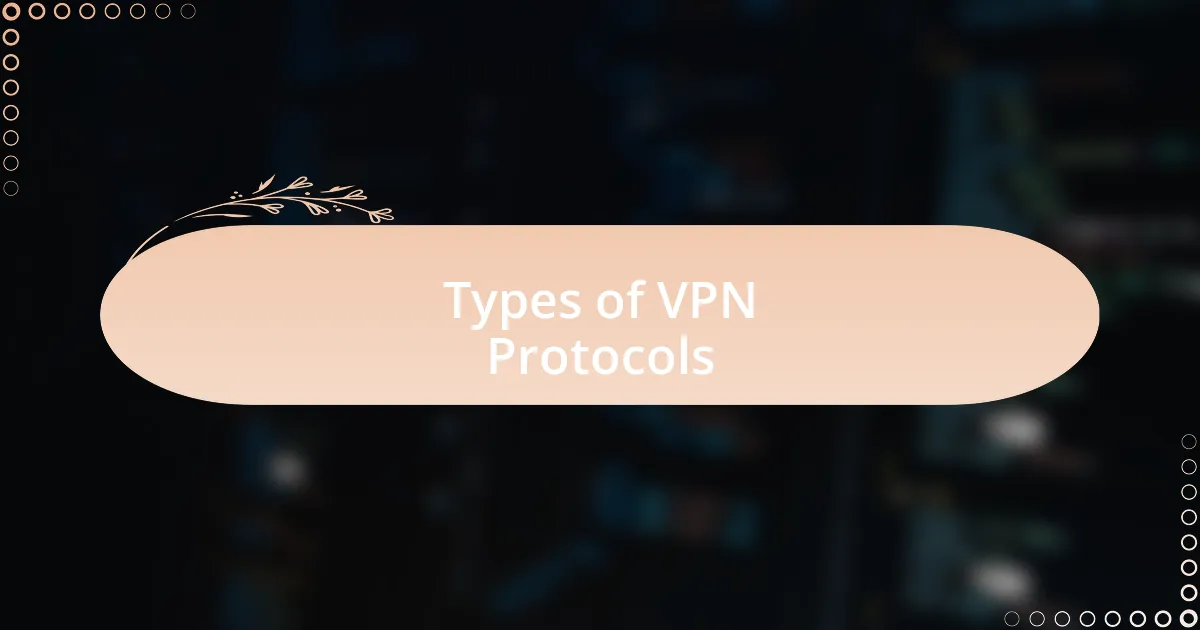
Types of VPN Protocols
When navigating the world of VPNs, understanding the different protocols available is essential for tailoring your online security. One notable protocol is OpenVPN, which I’ve found to be incredibly versatile. It operates over UDP and TCP, adapting to various network conditions, making it an excellent choice for maintaining speed while ensuring security. Have you ever tried to stream your favorite shows while traveling? OpenVPN helped me do just that, managing connections without sacrificing quality.
Another popular option is L2TP/IPsec, which combines the benefits of Layer 2 Tunneling Protocol and IPsec encryption. I remember when I first experimented with this protocol; it felt like a well-guarded secret, providing robust security but requiring a bit of setup finesse. The challenge was worth it, as the secure tunnel offered me peace of mind, especially when connecting to public Wi-Fi. Isn’t it reassuring to know that you can safeguard your data with just a little extra effort?
Lastly, let’s not forget PPTP, a simpler and faster, though less secure, choice. I used it for quick connections when I didn’t want to deal with complex configurations. While I appreciated its speed, I was always aware of its limitations. It made me ponder—what good is speed if it compromises security? Balancing speed and protection is crucial, and choosing the appropriate protocol can make all the difference in my online experience.
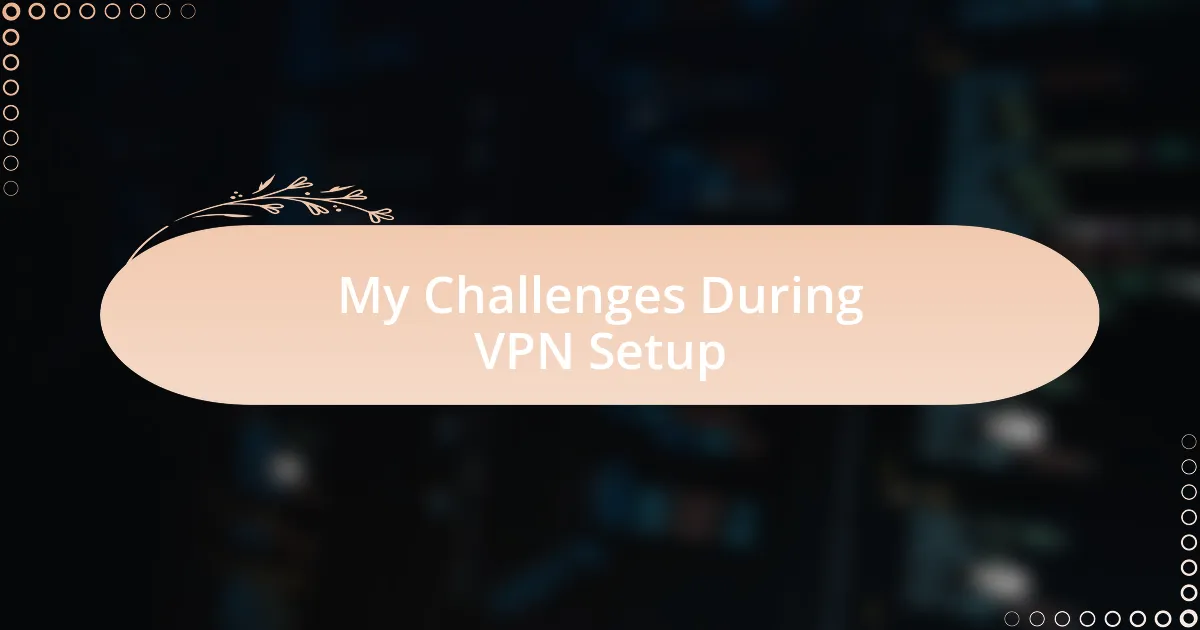
My Challenges During VPN Setup
Setting up my VPN was a bit trickier than I anticipated. I remember one instance where I encountered a dreaded “connection timeout” error after several attempts. It left me feeling frustrated because I needed the VPN for a secure work-related task. Have you ever faced that sinking feeling when technology just doesn’t cooperate?
On another occasion, configuring the firewall settings became a real headache. Balancing the VPN’s requirements with my system’s security settings felt like solving a complex puzzle, and I wasn’t sure if I was doing it right. It was a test of patience; I spent hours second-guessing every decision. Wouldn’t it be helpful if the setup process provided clearer guidance?
Lastly, I found that each device had its quirks during the installation process. When I switched from my laptop to my phone, I noticed the mobile app had fewer options, limiting my control over the connection. This made me question if a simple setup was truly beneficial, or if I was losing out on vital customization. After all, understanding my tools can drastically improve my online security experience.
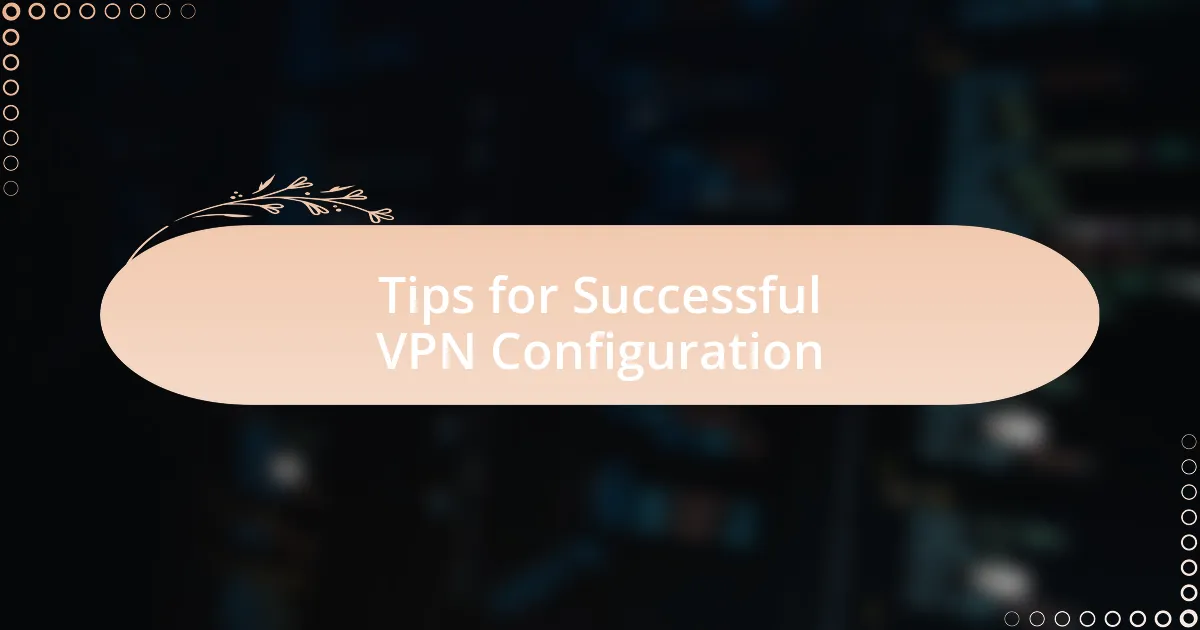
Tips for Successful VPN Configuration
When configuring my VPN, I learned that having a clear plan is essential. Before diving in, I took the time to list out my needs, such as what devices I wanted to connect and the type of data I intended to secure. This initial step made the process less overwhelming. Do you take a similar approach when setting up tech solutions, or do you prefer to jump right in?
Another key to successful VPN configuration, from my experience, is selecting a reliable provider. I remember the frustration of trying to work with a low-quality service that constantly dropped connections. The experience reminded me how crucial it is to invest in a reputable VPN that offers strong encryption and good customer support. Have you ever found yourself wishing you’d chosen differently after a frustrating session?
Lastly, I discovered the importance of running tests after the setup. Initially, I assumed everything was fine once I saw the “connected” message. But testing my connection speed and checking for DNS leaks revealed issues I hadn’t noticed. It’s a lesson that resonates: taking the extra step to ensure everything works as intended can save you from a lot of headaches down the road. Have you ever put off testing something only to regret it later?
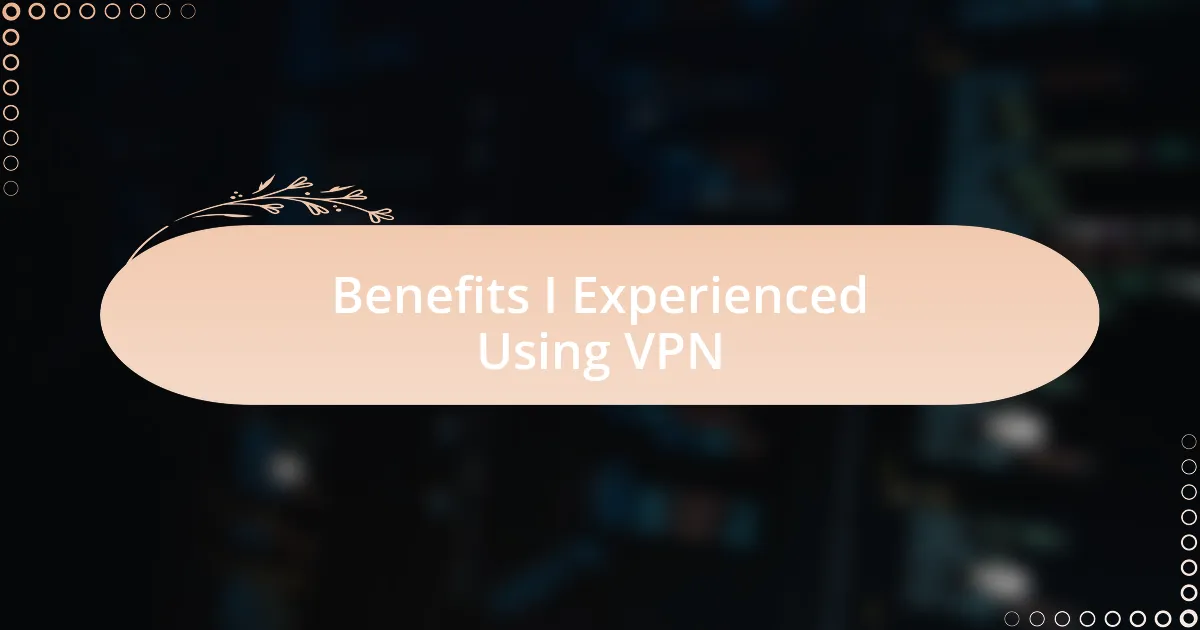
Benefits I Experienced Using VPN
After setting up my VPN, one significant benefit I experienced was enhanced privacy. I recall a moment when I realized how easily my online activities could be tracked. The feeling of anonymity while browsing, knowing my data was encrypted, gave me a sense of freedom I hadn’t felt before. Have you ever pondered how much of your personal information is exposed online?
Additionally, I found that using a VPN opened up a whole new world of content access. I distinctly remember trying to watch a show that was geo-restricted in my region. The simple act of connecting to a server in a different country transformed my viewing experience. Have you ever hit a wall with restricted content and wished for an easy solution?
Lastly, the security I gained while using public Wi-Fi was a game-changer for me. In coffee shops, I often used to feel uneasy about using my laptop, but after employing my VPN, that anxiety melted away. I could confidently surf the web, send emails, and connect with clients without worrying about potential cyber threats. What peace of mind does securing your connection when you’re out and about bring you?